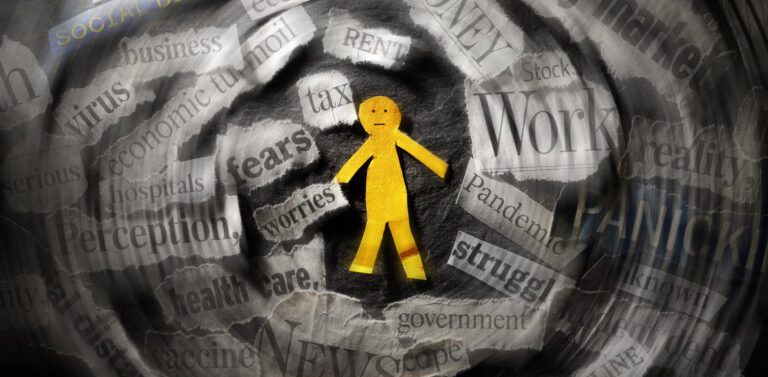Overwhelmed? The Torah Shows a Way Through in Behaalotecha
I’m a huge fan of the Tim Ferriss podcast. On his show, he interviews the “Michael Jordans” of their industries—world-class performers at the top of their game. His goal is to uncover the habits, routines, and mindsets that contribute to their success so listeners can apply those insights to their own lives.
But what resonates most deeply with me—and with many others—is when these larger-than-life individuals reveal their vulnerabilities. Despite their success, they struggle with the same things we do: self-doubt, daily discipline, insecurities, and fear. It’s incredibly hopeful to discover that behind the polished image, they are human too. That honesty makes their journey feel relatable—and their success, more attainable.
I was reminded of this idea recently when I had a couple over for Shabbat. I was gushing about how much I adore Rebbetzin Esti Hamilton, and how blessed we are to have her in our Miami Beach community. To my surprise, the young woman responded with a different take. She said she stopped attending Esti’s shiurim because, in her words, “She shares too many of her flaws—she’s so perfect in her imperfections.” In a way, it was a compliment, though unintended.
But for me, that’s exactly what makes Esti Hamilton so special. I don’t connect to perfection. I connect to realness. Her honesty—about raising a child with disabilities, her health challenges, her motherhood journey—makes her teachings feel alive and authentic. Through her struggles, she shows us what growth looks like.
Parshat Beha’alotecha: A Blueprint for Overwhelm
This week’s Parsha, Beha’alotecha, gives us a similar gift: a glimpse into Moshe Rabbeinu’s humanity. The greatest prophet of all time doesn’t just lead with unwavering strength—he breaks down. He turns to Hashem and says:
“I cannot carry this people alone… it is too heavy for me.” (Bamidbar 11:14)
It’s not the first time we’ve seen Moshe doubt himself. From the very beginning, he questioned his ability to lead, to speak, to rise to the task.
Now, in this parsha, he is emotionally overwhelmed by the burden of guiding a fragile, newly formed nation.
If even Moshe Rabbeinu—the holiest leader of our people—reached a point where he couldn’t take it anymore, what does that teach us about our own moments of overwhelm? His breakdown isn’t just a moment in history—it’s a mirror for our lives today, and a divine guide for how to move forward.
The Breakdown of a Leader
This episode is one of the most powerful moments in the Torah because it reveals Moshe’s vulnerability. What might appear as weakness is, in truth, a moment of profound strength and humility. Moshe doesn’t posture. He doesn’t push through with ego. Instead, he responds to the moment with surrender.
To admit, “I can’t do this alone,” takes deep humility. It means letting go of control and becoming open to new possibilities. Only then can someone truly become a vessel for divine guidance.
This is where we begin to relate to him. He isn’t distant or untouchable. In his exhaustion, he becomes real—exposing the emotional toll of responsibility.
We hear the desperation in his words:
“If this is the way You treat me, please kill me, if I have found favor in Your eyes—so that I not see my suffering.” (Bamidbar 11:15)
This is not just a cry—it’s a collapse. But in that collapse, we find connection. Because who among us hasn’t felt crushed under the weight of life’s demands? Moshe’s breakdown gives us permission to admit our own. It reminds us that feeling overwhelmed does not disqualify us from greatness—it’s part of the journey.
Even more profoundly, Moshe shows us what to do with that despair: he cries out to Hashem. He doesn’t shut down. He doesn’t escape. Moshe brings his pain to the Source. And in doing so, he models for us that asking for help is not outside the divine plan—it is the plan.
Moshe surrenders to something higher. And in that surrender, Hashem answers—not by removing the challenge, but by reframing the structure:
“Gather for Me seventy men from the elders of Israel, whom you know to be the people’s elders and officers…” (Bamidbar 11:16)
Hashem doesn’t take away the weight—He gives Moshe a way to carry it differently.
The Divine Formula for Overwhelm: A 5-Step Blueprint
This wasn’t just a one-time solution—it was a divine strategy, a Jewish approach to stress that speaks across generations.
1. Acknowledge the Overwhelm
Moshe names it plainly: “It is too heavy for me.”
We, too, need to name our truth—whether through journaling, a whispered prayer, or an honest conversation. Healing begins with honesty.
2. Turn to Hashem with Raw Honesty
Moshe doesn’t offer polished prayer—he offers pain.
Hashem can handle our realness. Our cries, our confusion, our fatigue. That’s where prayer becomes powerful.
3. Identify Trusted Support
Hashem instructs Moshe to find people “whom you know.”
Support isn’t random—it’s rooted in trust. Find your people: mentors, friends, spouses, therapists, rebbetzins. Your modern-day “70.”
4. Share the Burden
“Let them stand there with you.”
You’re not meant to carry it all. Delegation is not failure—it’s faith in God’s design for communal life.
5. Let Others Carry Your Light
Hashem doesn’t diminish Moshe’s power. He expands it.
When you let others help you, your light multiplies. You grow through sharing, not shrinking.
This is Hashem’s blueprint—not just for leaders and prophets, but for anyone facing the overwhelming demands of life.
Applying the Blueprint to Our Modern Lives
The divine formula Hashem gave Moshe isn’t just a moment in history—it’s a gift to all of us, a clear set of spiritual instructions for how to carry the weight when life feels too heavy. It’s Hashem’s way of saying,“Here’s how to make it through this part of the game.”
Let’s be honest: modern overwhelm is real. These days, it feels like we’re all carrying too much—career pressures that stretch our time, health issues that stem from stress, financial strain just to stay afloat. And if that weren’t enough, there’s the invisible labor: parenting young children, caring for loved ones, showing up in our marriages, keeping friendships alive. We’re “doing it all,” but often at the cost of our peace, our joy, and our well-being.
We’re moving fast, managing everything, and quietly breaking under the weight of it.
And yet, the Torah offers us an anchoring blueprint, a framework to follow when we reach that breaking point. Not just spiritually—but practically.
Naming Your Overwhelm
It starts with permission to be honest—with ourselves and with Hashem.
Moshe, the greatest leader, said the words so many of us are afraid to say: “It’s too heavy for me.”
Maybe for you, that honesty looks like journaling late at night. Or whispering a quiet admission to yourself in the car: “I can’t do this anymore.”
Maybe it’s opening up in therapy, or crying through a voice note to a friend. However it comes out, naming the truth is not weakness—it’s the beginning of healing.
Calling Out to Hashem
Moshe’s next step wasn’t polished prayer—it was raw, emotional pleading.
That means you don’t need fancy words. You don’t need a script. You just need truth.
Call out in your kitchen, in your car, in your heart. Tefillah can be messy and holy at the same time. Hashem doesn’t need perfection. He wants presence. When we show up vulnerably, He meets us there.
Gathering Your 70
Hashem told Moshe to find seventy elders—people “whom you know.”
That detail matters. These weren’t strangers. These were people Moshe trusted—people who had stood alongside the community in its most formative moments.
So ask yourself: Who are your seventy? Who are the people who hold you up when you can’t hold yourself?
Maybe it’s your spouse. A best friend. Your rebbetzin. Your therapist. Your babysitter who gives you an hour of quiet. The neighbor who brings over soup. Your WhatsApp group that keeps you grounded. These are your people. Your “elders.” Your circle of support.
Sharing the Burden
“Let them stand there with you,” Hashem says.
Not behind you. Not watching from afar. With you.
This is the Torah’s subtle, sacred message: You’re not meant to carry your burdens alone. That’s not noble—it’s unsustainable.
So delegate. Ask for help. Hire the cleaning help. Let someone else lead the carpool. Say yes when someone offers support, even if your instinct is to say “I’ve got it.” Because sometimes “I’ve got it” is code for “I’m drowning.”
In Jewish tradition, we elevate the act of carrying together. It’s a mitzvah. It’s how we were designed.
Let Others Carry Your Light
Hashem doesn’t take from Moshe’s soul—He expands it by sharing it with others.
That’s the final step in this divine formula: when you invite others into your struggle, you’re not diluted—you’re magnified.
Letting others walk beside you doesn’t dim your light. It allows your mission to grow, your soul to stretch, and your impact to ripple outward.
You don’t lose yourself when you share the load.
You find a deeper, more connected version of yourself—one supported by community, humility, and divine wisdom.
Embrace Strength in Surrender
Whether it’s Tim Ferriss revealing the struggles of high achievers, Rebbetzin Esti Hamilton sharing her personal journey, or Moshe Rabbeinu crying out to Hashem—we’re moved by those who show us their humanness.
Because that’s where the real wisdom lives.
Moshe’s greatest act in this parsha wasn’t performing miracles—it was saying, “I can’t do this alone.” That cry became the doorway to divine partnership and a spiritual system we still rely on today.
Rebbetzin Esti does the same. Her honesty gives others permission to breathe, to feel, and to begin again.
And maybe that’s what real strength looks like—not in doing it all, but in knowing when to reach out.
So if you’re carrying something heavy right now, let this be your reminder:
You don’t have to pretend. You don’t have to push through.
You can name it.
You can pray it.
You can share it.
And like Moshe, you may find that Hashem doesn’t remove the weight—He surrounds you with exactly what you need to carry it well.
Because you were never meant to do it alone.
Read more on sharing leadership: To Become A Leader Embrace Humility And Shared Leadership









Leave a Reply